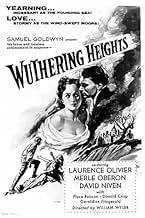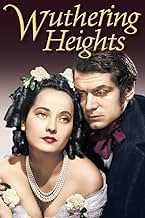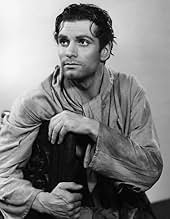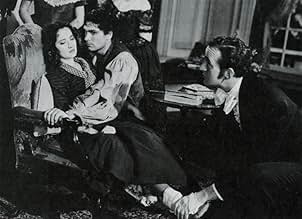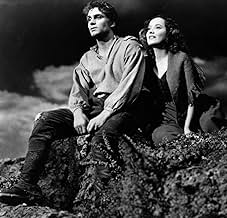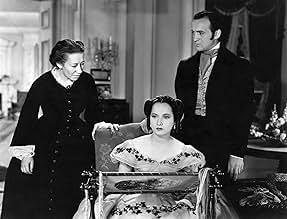NOTE IMDb
7,5/10
21 k
MA NOTE
Une domestique du domaine des Hauts de Hurlevent raconte à un voyageur le récit tragique des amants Cathy et Heathcliff.Une domestique du domaine des Hauts de Hurlevent raconte à un voyageur le récit tragique des amants Cathy et Heathcliff.Une domestique du domaine des Hauts de Hurlevent raconte à un voyageur le récit tragique des amants Cathy et Heathcliff.
- Réalisation
- Scénario
- Casting principal
- Récompensé par 1 Oscar
- 9 victoires et 7 nominations au total
Sarita Wooton
- Cathy (as a child)
- (as Sarita Wooten)
Frank Benson
- Heathcliff Servant
- (non crédité)
Romaine Callender
- Robert
- (non crédité)
Richard Clucas
- Little Boy
- (non crédité)
Vernon Downing
- Giles
- (non crédité)
Avis à la une
Great literature enriches the soul. The Brontes created great literature because they invented so much of what it means. They invented ways of observing the soul that hadn't already been mined by Shakespeare. If you want a great film that celebrates, explores, exploits Bronte, you can't escape the reality that you'd have to stretch film the same way Charlotte stretched perspective.
Didn't happen here. Olivier seemed good enough at what he knew (stage acting) but that isn't bendable to great experiences in film. Never was.
But you might want to watch this for another reason. The dialog and acting are ordinarily conceived. But the cinematography is extraordinary, from the very special Greg Toland. Greg DID stretch cinema in the way we mentioned. His greys have depth. When he photographs the heath, we feel the atmosphere as if the mist had emotion.
The interiors of the house are magnificent in design. And Toland's lighting and framing are so haunting.
This film is why Orson Welles wanted him on "Citizen Kane." You need to watch it to see where much of the disembodied ghost-observer comes from. With Toland, Cathy defines what we see and how.
But the actual story? Go read it instead.
Ted's Evaluation -- 2 of 3: Has some interesting elements.
Didn't happen here. Olivier seemed good enough at what he knew (stage acting) but that isn't bendable to great experiences in film. Never was.
But you might want to watch this for another reason. The dialog and acting are ordinarily conceived. But the cinematography is extraordinary, from the very special Greg Toland. Greg DID stretch cinema in the way we mentioned. His greys have depth. When he photographs the heath, we feel the atmosphere as if the mist had emotion.
The interiors of the house are magnificent in design. And Toland's lighting and framing are so haunting.
This film is why Orson Welles wanted him on "Citizen Kane." You need to watch it to see where much of the disembodied ghost-observer comes from. With Toland, Cathy defines what we see and how.
But the actual story? Go read it instead.
Ted's Evaluation -- 2 of 3: Has some interesting elements.
Talk about a brooding outdoors, those moody moors may represent a sense of liberation for the lovers, but they're not exactly inviting. Besides, it rains all the time, so best to be in the house even if mansions represent the confining space of class and class privilege. That's the trouble. Cathy is 'to the manor born', as they say. Thus she's really torn between the wild outdoors and the comforts of ballrooms and servants.
Then there's the enigmatic Heathcliffe, a dark wild-souled type guy, perfectly at home in those bleak rolling hills. He was a street ragamuffin before Cathy's elderly father adopted him into the manor as a stable boy. But he and a young Cathy manage to bond despite the class difference, a bond that eventually blossoms into true love. But that true love only breaks to the surface in the wild outdoors where a common humanity replaces artificial social distinctions. If only Cathy could find the will to break free of the leisure class.
What a great visual experience, the b&w expertly coordinated with the settings. When the two lovers approach the rocky crag, there's almost a feeling of an outdoor altar calling to them amidst the brooding hills. It's such a perfect visual contrast to the high-key ballrooms and parlors of the Lintons. The Lintons, however, are not to be despised despite their airs and privileges. In fact, they are very real victims of Cathy's suppressed feelings and Heathcliffe's cold calculations. As it turns out, there is no spectral salvation for them. As a result, the love being portrayed here is a kind of mad love, one that brings tragedy to all concerned. Thus, there's a reason those moors brood in dark fashion, while the movie itself remains the best of the many makes and remakes.
Then there's the enigmatic Heathcliffe, a dark wild-souled type guy, perfectly at home in those bleak rolling hills. He was a street ragamuffin before Cathy's elderly father adopted him into the manor as a stable boy. But he and a young Cathy manage to bond despite the class difference, a bond that eventually blossoms into true love. But that true love only breaks to the surface in the wild outdoors where a common humanity replaces artificial social distinctions. If only Cathy could find the will to break free of the leisure class.
What a great visual experience, the b&w expertly coordinated with the settings. When the two lovers approach the rocky crag, there's almost a feeling of an outdoor altar calling to them amidst the brooding hills. It's such a perfect visual contrast to the high-key ballrooms and parlors of the Lintons. The Lintons, however, are not to be despised despite their airs and privileges. In fact, they are very real victims of Cathy's suppressed feelings and Heathcliffe's cold calculations. As it turns out, there is no spectral salvation for them. As a result, the love being portrayed here is a kind of mad love, one that brings tragedy to all concerned. Thus, there's a reason those moors brood in dark fashion, while the movie itself remains the best of the many makes and remakes.
I saw this film many years before I read the book, I know which I prefer - OK, maybe with rose-tinted spectacles on. The book by Emily Bronte is an undeniable classic as is this film version but imho this is a much better use of one hundred and five minutes of life. And though they keep trying, this will remain the best condensation of the story, Wuthering Lites c/o the original Fantasy Factory.
Waif brought into well off Yorkshire home, grows up to fall in violent love with the masters daughter and violent hate with the son, and eventually owns the estate but not the woman. Laurence Olivier and Merle Oberon are perfect as the manic birds of a feather Heathcliff and Cathy with David Niven as the elegant sidelined husband. Everyone is portrayed as faulty or unlikeable in some way, romance is seen as hopeless childishness leading at best to passionate petulance, at worst to death; love is as strange as people. It's relentlessly beautiful stuff, gloriously photographed by Gregg Toland with a glowing atmosphere and a most assured production than has not been possible to achieve again. The spirit of nonsensical romance has been lost in this more cynical age. Favourite bits: Miles Mander's melodramatics at the beginning resulting in Flora Robson's picture-long flashback; the windswept pair on the rocks; the pair gatecrashing the dance; Oberon's unravelling to Niven and the tear-jerking finale. Director William Wyler had a long and illustrious career, but to my mind he never bettered this effort.
Watch it and weep; not only at the film's content but for a cinematic era long dead and never coming back.
Waif brought into well off Yorkshire home, grows up to fall in violent love with the masters daughter and violent hate with the son, and eventually owns the estate but not the woman. Laurence Olivier and Merle Oberon are perfect as the manic birds of a feather Heathcliff and Cathy with David Niven as the elegant sidelined husband. Everyone is portrayed as faulty or unlikeable in some way, romance is seen as hopeless childishness leading at best to passionate petulance, at worst to death; love is as strange as people. It's relentlessly beautiful stuff, gloriously photographed by Gregg Toland with a glowing atmosphere and a most assured production than has not been possible to achieve again. The spirit of nonsensical romance has been lost in this more cynical age. Favourite bits: Miles Mander's melodramatics at the beginning resulting in Flora Robson's picture-long flashback; the windswept pair on the rocks; the pair gatecrashing the dance; Oberon's unravelling to Niven and the tear-jerking finale. Director William Wyler had a long and illustrious career, but to my mind he never bettered this effort.
Watch it and weep; not only at the film's content but for a cinematic era long dead and never coming back.
This classic version of the Bronte novel is probably familiar to most movie fans, and with good reason. Although the recent Ralph Fiennes version is also excellent, nothing can quite surpass the 1939 film's bleak black-and-white cinematography or the impassioned performance of Laurence Olivier. Some of us still mourn that his then-wife, Vivien Leigh, wasn't granted her wish to be cast as Catherine, but Merle Oberon is nonetheless excellent: her Catherine isn't quite likable, but then, she isn't supposed to be. Instead of sugar-coating the story as Hollywood is so wont to do, the filmmakers give us Cathy and Heathcliff as they should be: ruthless, selfish, destructive, and fascinating. The only major drawback is the saccharine musical score, which tries to make this wild, haunting story into a candy-box romance. Fortunately, all the other elements resist this tendency. Even though the film only covers half the novel, you'll find it satisfying and unforgettable.
SPOILERS Out of the cinematic versions of Emily Bronte's incredible tale, this 1939 version is one of the furthest from it. However, as a piece of cinematic art, it is the finest, a shining example of Hollywood craftmanship made at a time when so many classic movies were being churned out. Producer Sam Goldwyn said it was the best movie he ever made. It's certainly director William Wyler's best film, and that includes Ben Hur. While Bronte's novel is a lot more than just a love story, this almost reduces it to being just a love story. Never mind, because as a love story, this film works wonderfully. Like almost all great love stories, it's gloriously romantic, emotionally intense and ultimately incredibly moving.
The controversial decision to miss out almost the entire second half of the book allowed the filmmakers to concentrate on the Heathcliff/Cathy love story, and Laurence Olivier and Merle Oberon both have incredible chemistry and strengh in their performances. No, they are not Bronte's characters, especially the film's version of Heathcliff, who here is FAR too nice, but are definitely one of the greatest of Hollywood's cinematic couples. This is especially notable in the scenes set on the moors, where we are definitely in that Olde Hollywood romantic never never land where the music soars and passion had to be, and was, encapsulated in a kiss. Olivier is impressive delivering some of Bronte's lines, of which there are a surprising amount, and the film does follow the book's plot very closely, it just tones down the darkness.
There are many superbly done sequences- the incredibly atmospheric opening where a traveller arrives at Heathcliff's house, all the scenes on the moors, Cathy's speech to Nelly "I AM Heathcliff", and of course, more than any other scene, the death of Cathy. As Heathcliff takes the dying Cathy to the window to see the moors once more and she finally dies virtually standing up, all the while while Alfred Newman's love theme plays and plays. This is one of the moving and also one of the most beautiful and artistic deaths in Hollywood history, all the more powerful for actually being comparatively understated by Hollywood standards of the time. Only those who had read the book or knew of the missing second half would know there was more in the story to come, in the context of the film the tale seems complete. Some don't like the final scene of Heathcliff and Cathy's ghosts wondering in the snow, but it is actually closer to the book's actual ending than most seem to admit. It's also one of the best tearjerkers ever, period.
Most people read the book and are than disappointed when they see this. It's therefore best to see this first, and to appreciate it as one of the great Hollywood love stories, before THAN reading the book. Yes, the book is still better, but than most books are.
The controversial decision to miss out almost the entire second half of the book allowed the filmmakers to concentrate on the Heathcliff/Cathy love story, and Laurence Olivier and Merle Oberon both have incredible chemistry and strengh in their performances. No, they are not Bronte's characters, especially the film's version of Heathcliff, who here is FAR too nice, but are definitely one of the greatest of Hollywood's cinematic couples. This is especially notable in the scenes set on the moors, where we are definitely in that Olde Hollywood romantic never never land where the music soars and passion had to be, and was, encapsulated in a kiss. Olivier is impressive delivering some of Bronte's lines, of which there are a surprising amount, and the film does follow the book's plot very closely, it just tones down the darkness.
There are many superbly done sequences- the incredibly atmospheric opening where a traveller arrives at Heathcliff's house, all the scenes on the moors, Cathy's speech to Nelly "I AM Heathcliff", and of course, more than any other scene, the death of Cathy. As Heathcliff takes the dying Cathy to the window to see the moors once more and she finally dies virtually standing up, all the while while Alfred Newman's love theme plays and plays. This is one of the moving and also one of the most beautiful and artistic deaths in Hollywood history, all the more powerful for actually being comparatively understated by Hollywood standards of the time. Only those who had read the book or knew of the missing second half would know there was more in the story to come, in the context of the film the tale seems complete. Some don't like the final scene of Heathcliff and Cathy's ghosts wondering in the snow, but it is actually closer to the book's actual ending than most seem to admit. It's also one of the best tearjerkers ever, period.
Most people read the book and are than disappointed when they see this. It's therefore best to see this first, and to appreciate it as one of the great Hollywood love stories, before THAN reading the book. Yes, the book is still better, but than most books are.
Le saviez-vous
- AnecdotesLaurence Olivier found himself becoming increasingly annoyed with director William Wyler's exhausting style of filmmaking. After yet another take, he is said to have exclaimed, "For God's sake, I did it sitting down. I did it with a smile. I did it with a smirk. I did it scratching my ear. I did it with my back to the camera. How do you want me to do it?" Wyler's retort was, "I want it better." However, Olivier later said these multiple takes helped him learn to succeed as a movie actor.
- GaffesThough the social situations, and even the soundtrack, are consistent with the novel's timeframe of 1770-1801, the Colonial/Napoleonic era, the costumes are an odd mix of mid-Victorian and American Civil War.
- Citations
Heathcliff: Catherine Earnshaw, may you not rest so long as I live on! I killed you. Haunt me, then! Haunt your murderer! I know that ghosts have wandered on the Earth. Be with me always. Take any form, drive me mad, only do not leave me in this dark alone where I cannot find you. I cannot live without my life! I cannot die without my soul.
- Crédits fousOpening credits prologue: On the barren Yorkshire moors in England, a hundred years ago, stood a house as bleak and desolate as the wastes around it. Only a stranger lost in a storm would have dared to knock at the door of Wuthering Heights.
- Versions alternativesThere is an Italian edition of this film on DVD, distributed by DNA Srl: "CIME TEMPESTOSE (1939) + ORGOGLIO E PREGIUDIZIO (1940)" (2 Films on a single DVD), re-edited with the contribution of film historian Riccardo Cusin. This version is also available for streaming on some platforms.
- ConnexionsFeatured in AFI Life Achievement Award: A Tribute to William Wyler (1976)
- Bandes originalesPiano Sonata in A major, K.331: Rondo alla Turca
(1778) (uncredited)
Music by Wolfgang Amadeus Mozart
Played by Alice Ehlers on harpsichord
Meilleurs choix
Connectez-vous pour évaluer et suivre la liste de favoris afin de recevoir des recommandations personnalisées
Détails
- Date de sortie
- Pays d’origine
- Site officiel
- Langue
- Aussi connu sous le nom de
- Cumbres borrascosas
- Lieux de tournage
- Société de production
- Voir plus de crédits d'entreprise sur IMDbPro
Box-office
- Montant brut aux États-Unis et au Canada
- 624 643 $US
- Week-end de sortie aux États-Unis et au Canada
- 15 493 $US
- 9 avr. 1989
- Montant brut mondial
- 624 643 $US
- Durée1 heure 44 minutes
- Couleur
- Rapport de forme
- 1.37 : 1
Contribuer à cette page
Suggérer une modification ou ajouter du contenu manquant



